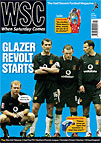 Sky would kill for last day dramatics like this. Bobby McMahon retells the tale of one of the closest ever title races
Sky would kill for last day dramatics like this. Bobby McMahon retells the tale of one of the closest ever title races
The long-term significance
This season brought to an end a period in which teams other than Rangers and Celtic actually won the Scottish League. In the 19 seasons after the end of the Second World War, non-Old Firms clubs took eight of the championships. In the 40 years since, that has only happened four times. After winning the domestic treble the previous season, Rangers slumped to fifth while Celtic could only manage to finish eighth.
The Scottish Cup final, however, gave a sign of things to come. With newly appointed manager Jock Stein in charge, Celtic beat Dunfermline with a late goal from Billy McNeill to win. The next season Celtic won the first of nine consecutive league titles, a feat equalled by Rangers between 1988-89 and 1996-97.
Story of the season
Hearts and Kilmarnock were the only two teams to lead the league, with the exception of two days when Dunfermline sat top. On the last day of the season Hearts led Killie by two points – this in the days before three points for a win. Kilmarnock, who had been league runners-up in four of the five previous seasons, had to face Hearts at Tynecastle needing victory by a two-goal margin to take their first league title. In front of 38,000, Killie won 2-0 and took the championship through goal average by 0.04 of a goal.
The team wobbled just after the New Year, winning only two games from eight. They finished strongly, however, with seven wins and a draw. Manager Willie Waddell had announced in October 1964 that he would be leaving at the end of the season to become a full-time journalist, but he was to return to management later with Rangers.
Many Hearts fans still contend that the last game of the season didn’t cost them the league but that it was due to an incredible 7-1 home loss to Dundee in February. The score was so unexpected that Grandstand presenter David Coleman was said to have questioned the reliability of the teleprinter.
For the record books
Jim Forrest of Rangers finished with 30 league goals, but added another 27 in other competitions to set a post-war Scottish record. Goal average was dumped six years later as the tie-splitting mechanism and replaced by goal difference. On the last day of the 1985-86 season, another 2-0 defeat for Hearts, at Dundee, meant they lost the title on goal difference to Celtic having led the table for nearly five months. If the timing of the rules had been reversed, Hearts would have two more Scottish titles.
Same place today
The top tier in Scotland has gone through a couple of transformations, but the Old Firm have maintained their position in the upper echelons throughout. Aberdeen should have been relegated at the end of the 2000 season but escaped the drop because the Scottish Premier League was expanded from ten clubs to 12.
Moved furthest away
Oblivion is about as far away as you can go. Two years after finishing with 30 losses and letting in 99 goals in their 34 games, Glasgow club Third Lanark were declared bankrupt and thrown out of the league, never to return. Formed as the football team of a rifle regiment, they had been Scottish champions in 1904 and Cup winners in 1889 and 1905.
Went on to greater things
Alex Ferguson ~ Signed a full-time professional contract in 1964 with Dunfermline after moving from St Johnstone. The future St Mirren manager was dropped for the Scottish Cup final against Celtic, but finished joint top scorer the following year.
Bobby Ferguson ~ A member of Killie’s championship-winning side, he moved to West Ham in 1967 for a then world record fee for a goalkeeper.
Charlie Cooke ~ A midfield playmaker converted from an orthodox winger, he was signed by Dundee from Aberdeen. He was to win the FA Cup and Cup-Winners Cup with Chelsea.
Disappering from view
Frank Haffey ~ The most infamous of error-prone Scottish goalies. Gained his second and last Scotland cap at Wembley in 1961, conceding nine. Sold by Celtic to Swindon in October 1964 and shortly afterwards moved to Australia where he became a nightclub singer.
Kilmarnock ~ Finished third the next year after winning the title, but haven’t been higher than fourth since, though they did win the Scottish Cup in 1997. Jim Baxter Rangers’ star player broke a leg in December 1964. He was back in 12 weeks, but many believe he was never quite the same again
From WSC 221 July 2005. What was happening this month